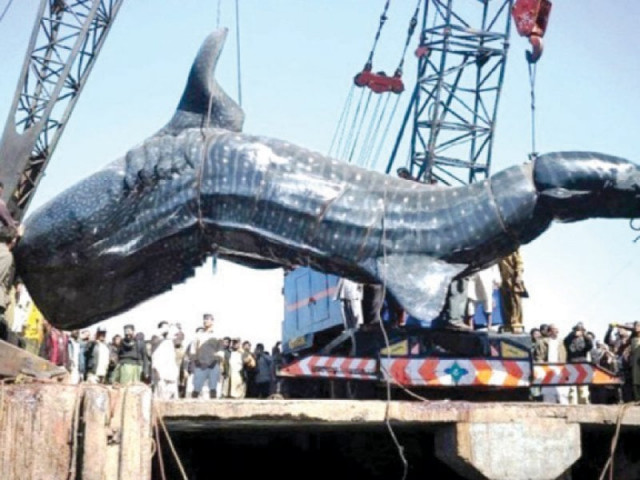And another gone…: Karachi’s shores bring in dead whale shark
The four tonne animal was chopped up and sold at the harbour .

The price is right? Rs20 per kilogramme was the rate at which pieces of the whale shark were sold at the Karachi harbour. PHOTOS: FILE
Another whale shark was dragged on Thursday morning to the Karachi harbour. But unlike the other two specimens caught over the last two years, fishermen sold it and cut into pieces before the media got wind of its arrival.
According to a World Wide Fund for Nature - Pakistan (WWF-P), the whale shark - which was around 5.4 metres long - got tangled in a gillnet near Phor in Sonmiani Bay on Wednesday morning. It had reportedly died before it got caught in the net.
The whale shark is the largest species of fish in the world - it is harmless marine animal which is found in tropical and subtropical waters.

While talking to The Express Tribune, Muhammad Moazzam Khan, a technical adviser of WWF- P, said, “We’re trying to make strict laws in order to prevent the fish from being caught during fishing expeditions. We weren’t able to register a case against the fishermen who caught the whale shark and sold it.” He added that the wildlife acts of both Sindh and Balochistan are being amended and whale sharks need to be included in a list of species protected by legislation.
The whale shark is the second one to be caught this year. It weighed the same as the one dragged to the harbour on February 7 this year - around four tonnes. Khan said that the fish was cut up into pieces and sold for between Rs15 and Rs20 per kilogramme. Fishermen generally don’t like catching whale sharks as it is considered a bad omen, but selling one off could earn them big money. WWF’s global website states that the fish is “highly valued” on the international market because of the meat, fins and oil. In Pakistan, whale shark meat is used to produce fish meal while the liver oil is smeared on the hull of boats to make them more resistant to the rough seas.
According to some estimates, the 14 feet long specimen which was dragged to the harbour on February 7 last year could have fetched around Rs1.5 million in the international market.
According to WW-P, before Partition, people used to hunt whale sharks along the coasts of Sindh and Balochistan with harpoons. Though this activity petered out during the 1950s, whale sharks continue to die as a result of an increase in fishing fleets. Their worst enemies are now fishing nets, in which they get entangled and die.
Protecting the species
The waters off the country’s coast are a breeding ground for the species, which has been listed as vulnerable on WWF’s website and is on the International Union for the Conservation of Nature’s (IUCN) ‘Red List’ of threatened species.
Khan said that in the past two years, at least eight whale sharks have been trapped in fishing nets and killed. He pointed out that in India, whale sharks are included among the protected species and have the same status as that of the Bengal Tiger and the rhinoceros. But in Pakistan, whale sharks are not protected by any legislation, he said.
The good news is that in 1976, Pakistan became a signatory to the Convention in International Trade in Endangered Species of Fauna and Flora (CITES). Under the convention, the export of product made from whale sharks is prohibited.
WWF-P director Rab Nawaz said an awareness programme has been started in Pakistan to make fishermen aware of the importance of whale sharks. As a result of this training, one fisherman was able to release 3.5 metre long whale shark trapped in his net after a tiring effort of more than four near Ormara. He urged the authorities to support WWF-P’s programme on protection of whale sharks. Nawaz also pointed out that if whale sharks continue to get tangled at this rate, it will be extinct from Pakistan’s waters by the next decade.
Published in The Express Tribune, June 14th, 2013.



















COMMENTS
Comments are moderated and generally will be posted if they are on-topic and not abusive.
For more information, please see our Comments FAQ